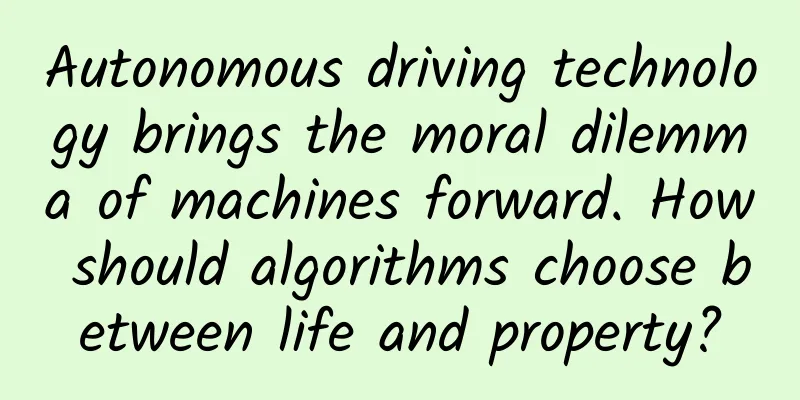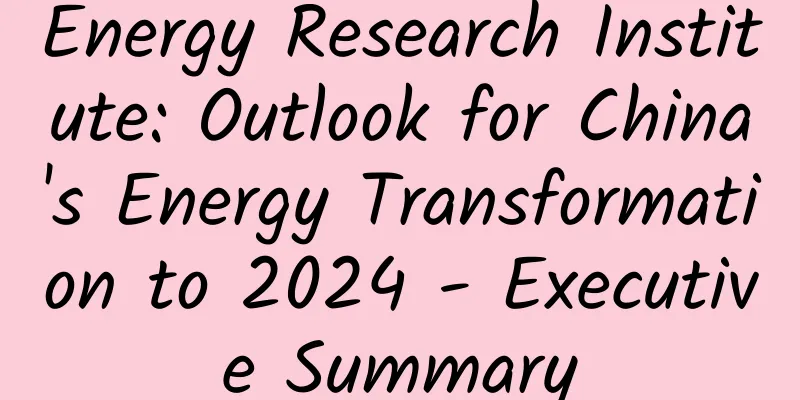Autonomous driving technology brings the moral dilemma of machines forward. How should algorithms choose between life and property?

|
In the field of science fiction, the moral and ethical dilemmas facing artificial intelligence in the future often become the core of discussion. Many film and television works we are familiar with are based on this, such as "I, Robot", "Robot Butler", "Artificial Intelligence", etc. The explosion of related literary and artistic works reflects people's strong concern about this issue. However, in fact, due to many obstacles in electronic neural network technology, the current artificial intelligence technology cannot get rid of the "Chinese House" status quo, which is often "how much artificial intelligence there is, how much intelligence there is", and it is still far away for machines to have human-like perception and thinking abilities. However, with the entry of companies such as Alibaba and Baidu, autonomous driving technology, as a travel outlet, is getting closer and closer to us because it can be realized under weak artificial intelligence, relying on complex sensor arrays and perfect computer algorithms. Relatively speaking, the ethical problems of robots that we envision for artificial intelligence will inevitably be brought to people's attention earlier after the implementation of autonomous driving technology. Recently, scientists at the University of Osbaruch in Germany said that they have developed a mathematical model for moral choices that will help future robots or autonomous driving systems make the right decisions in life and death situations. However, can many moral dilemmas that are difficult even for humans to understand really be solved through algorithms? Algorithms are not the master key to autonomous driving Morality refers to the conceptual standard for measuring proper behavior. It refers to the behavioral norms that a certain society uses to regulate the relationship between people and between individuals and society. It is formed slowly in human society and has the characteristics of the times. Unlike the rigorous codes that make up machine algorithms, morality is a vague concept. Even humans themselves have different understandings of it in different groups, different times, and different contexts. Moreover, the existence and value of morality itself are often the topic of discussion among philosophers. One of the most famous thought experiments, the "trolley problem", is a mockery of moral standards. The experiment is like this: suppose you see a trolley, about to hit six people on the track ahead, and you have the opportunity to switch the track to make it rush onto another track with only one person. What would you choose? According to the conventional principle of "majority interests", you should sacrifice one person to save the lives of six people, but in this way you will be partially responsible for the death of this one person. If you do nothing and watch the trolley accident, this approach is also morally flawed. Therefore, in the "trolley problem", there is no so-called "perfect morality". So, when encountering an unavoidable traffic accident, how should the autonomous driving system make a decision? Which is more important, interests or morality? "Human behavior in difficult situations can be simulated using a very simple life-based model, in which the participants include every person, animal, and inanimate object," said Professor Leon Sutfeld of the University of Osbaruch in Germany. Although the specific algorithm has not been announced, based on Professor Leon Sutfeld's words, we can roughly guess that his team is trying to quantify people, animals, non-living objects and other targets on the scene into mathematical models under different actual conditions, and use this as the basis for autonomous driving avoidance and collision measures. (Official account:) I believe that it is not difficult to abstract the moral model recognized by the public, such as "most people>minority", "children>women>men>animals>non-living things>", "BBA>Wuling Hongguang", etc. But once many real factors are involved, under the premise of quantification of all factors, the situation will become more complicated and dark under the competition between moral ethics and reality. Ultimately, autonomous driving also serves the car owners. When the interests of the car owners conflict with the moral model, how should the designers of the autonomous driving system choose? For example, at any time, no one would buy an autonomous driving system that does not prioritize the safety of the owner, right? For example, when an accident is unavoidable, faced with the choice of crashing into a luxury car or a person, on the one hand there is the luxury car compensation of tens of millions, on the other hand there is the civil compensation of hundreds of thousands, will the car owner choose to consider his own interests more, or be willing to pay the price for morality? Even though no car owner may admit that they would prefer the autonomous driving system to take care of their own interests, the designers of the autonomous driving system cannot but give specific algorithmic preferences before the system goes online. After all, unlike human uncertainty, the algorithmic process and results are unique and certain. Can they bear the heavy burden of "abandoning public morality for the sake of promotion"? As the travel trend emerges, who will take off? Here, (official account:) It is necessary to clarify that this article is not intended to discredit or even criticize self-driving cars. Although many traffic accidents have occurred so far, whether it is Google, Uber's autonomous driving road tests or Tesla's AutoPilot system, in fact, almost all of them are due to improper driver operation or passive violations by other vehicles. Compared with human driving, the accident rate is significantly reduced. With the algorithm still in the development stage, the superiority of autonomous driving has already been revealed. After all, the speed of machine calculations is not at the same level as human reaction speed. When algorithms and car perception systems are perfected, and even when there are no more humans driving cars in the world and all autonomous driving systems are connected to the Internet in real time, the traffic accident rate will drop to near zero, and the so-called moral dilemma will be solved. Once the Internet of Vehicles is realized, travel will become more and more efficient and comfortable under the unified planning of optimized routes. This change has already taken shape with the development of autonomous driving. It is no wonder that many technology giants also regard the Internet of Travel as the next big trend. It is also worth mentioning that thanks to the early layout of Chinese companies such as Baidu and Alibaba, China is no longer a bystander of change, but is standing at the forefront of technology and becoming a veteran player at the autonomous driving table, jointly leading this travel revolution with global developers. As a winner of Toutiao's Qingyun Plan and Baijiahao's Bai+ Plan, the 2019 Baidu Digital Author of the Year, the Baijiahao's Most Popular Author in the Technology Field, the 2019 Sogou Technology and Culture Author, and the 2021 Baijiahao Quarterly Influential Creator, he has won many awards, including the 2013 Sohu Best Industry Media Person, the 2015 China New Media Entrepreneurship Competition Beijing Third Place, the 2015 Guangmang Experience Award, the 2015 China New Media Entrepreneurship Competition Finals Third Place, and the 2018 Baidu Dynamic Annual Powerful Celebrity. |
>>: NIO submits prospectus, Li Bin donates one-third of shares to establish a trust fund
Recommend
How much does it cost to develop a Beihai catering mini program? How much is the price for developing Beihai catering mini program?
More and more businesses are paying attention to ...
What tricks have various countries prepared for the "gold rush"?
Venus was a favorite of early human deep space ex...
How to quickly increase fans on Kuaishou? How to buy Kuaishou fans?
Professional Douyin and Kuaishou likes-boosting p...
Autohome Financial Festival concluded successfully with multiple benefits winning overwhelming favor from users
As of March 31, 2018, the Hundred-Day Financial F...
Once the wound heals, the pain is forgotten, so why do scars remain after the wound heals?
Everyone is familiar with "scar physique&quo...
How to escape the fatal trap of this marketing copy?
Such inhumane operations can only be avoided by c...
[Smart Farmers] Understanding from one picture: How to get back the “tomato taste” in your memory?
[Smart Farmers] Understanding from one picture: H...
The vain flamingo actually raised its babies to the point of vomiting blood?
The national emblem of the Bahamas is a shield, w...
Accenture report: Vision of digital health technology
Accenture has released a new report, "Digita...
Three important concepts that new media marketers must have: insight, traffic, and profit
To plan new media marketing for a brand, creative...
From 0 to 1, how to build a user portrait system?
Starting from the data product level, the article...
Case analysis: How can a product achieve user growth?
In recent years, the popularity of online educati...
Programmer: Why don’t I recommend you to go to an outsourcing company?
[[138822]] In fact, we all know clearly that &quo...
Apple's gradually losing TV position is attracting the world's top companies
Reed Hastings, founder and CEO of Netflix, an Ame...
User operation, how to retain users after fission?
What I want to discuss with you this time is how ...









